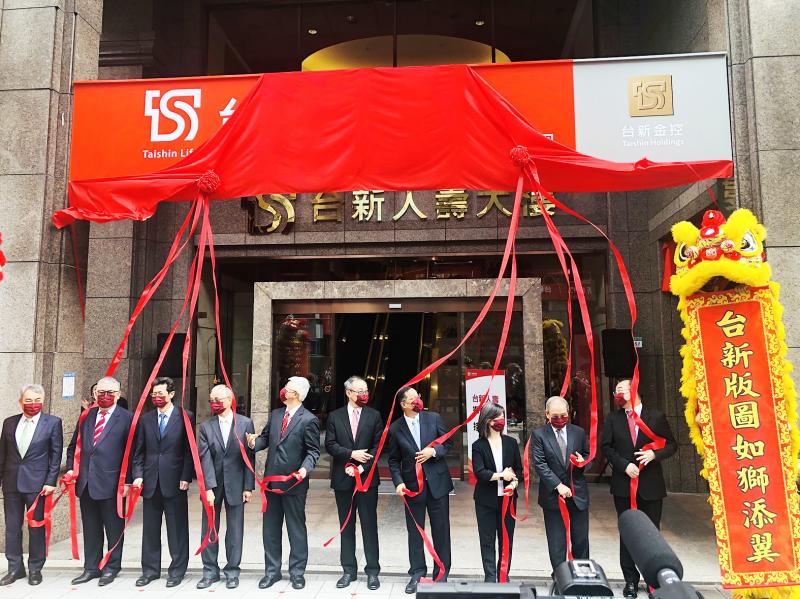Taishin Life Insurance Co Ltd (台新人壽), a new life insurance unit of Taishin Financial Holding Co (台新金控), aims to generate first-year premiums (FYPs) of NT$4 billion (US$142.93 million) during the second half of this year, the insurer’s chairman Barry Tsai (蔡康) said at its opening ceremony in Taipei yesterday.
Taishin Financial completed its acquisition of Prudential Life Insurance Co of Taiwan (保德信人壽) on June 30, and gained approval from the Ministry on Economic Affairs to change the insurer’s name to Taishin Life on Aug. 10. The opening ceremony for the insurance subsidiary was held in front of what used to be Prudential Life’s headquarters.
Taishin Life’s insurance policy sales grew rapidly last month after it was integrated into Taishin Financial, as it gained assistance from the financial conglomerate’s banking arm, Taishin International Bank (台新銀行), in marketing the policies, Tsai told reporters at the ceremony.

Photo: Kelson Wang, Taipei Times
It generated first-year premiums of NT$939 million last month, 20 times the first-year premiums in June and 274 percent greater than cumulative first-year premiums of NT$251 million for the first six months of this year, Tsai said.
More than 90 percent of last month’s sales were generated through Taishin Bank’s marketing channels, he added.
“We will hit NT$4 billion in first-year premiums for the second half of this year, based on our marketing performance so far,” Tsai said, adding that Taishin Life would concentrate on selling US dollar-denominated policies.
Given its increasing revenue, the life insurer would put more funds in areas such as local stocks, foreign stocks and bonds, and real estate, Taishin Financial president Welch Lin (林維俊) told reporters.
Taishin Life is not a large-scale operation, but it is built on a solid foundation, as Prudential Life had been rewarded by the Financial Supervisory Commission for how well its operations were run for 10 years in a row, Lin said.
The new unit contributed profits of NT$300 million last month, he said.
“This year was the 20th year since Taishin Financial was launched, and we finally have three engines: banks, securities and insurance... We aim to catch up with our peers,” Lin said.
Taishin Financial said it would help Taishin Life develop new products, while the life insurer, which has 680 sales agents, would recruit more staff and enhance its investment team to boost competitiveness.

Taiwan Semiconductor Manufacturing Co (TSMC, 台積電) secured a record 70.2 percent share of the global foundry business in the second quarter, up from 67.6 percent the previous quarter, and continued widening its lead over second-placed Samsung Electronics Co, TrendForce Corp (集邦科技) said on Monday. TSMC posted US$30.24 billion in sales in the April-to-June period, up 18.5 percent from the previous quarter, driven by major smartphone customers entering their ramp-up cycle and robust demand for artificial intelligence chips, laptops and PCs, which boosted wafer shipments and average selling prices, TrendForce said in a report. Samsung’s sales also grew in the second quarter, up

On Tuesday, US President Donald Trump weighed in on a pressing national issue: The rebranding of a restaurant chain. Last week, Cracker Barrel, a Tennessee company whose nationwide locations lean heavily on a cozy, old-timey aesthetic — “rocking chairs on the porch, a warm fire in the hearth, peg games on the table” — announced it was updating its logo. Uncle Herschel, the man who once appeared next to the letters with a barrel, was gone. It sparked ire on the right, with Donald Trump Jr leading a charge against the rebranding: “WTF is wrong with Cracker Barrel?!” Later, Trump Sr weighed

LIMITED IMPACT: Investor confidence was likely sustained by its relatively small exposure to the Chinese market, as only less advanced chips are made in Nanjing Taiwan Semiconductor Manufacturing Co (TSMC, 台積電) saw its stock price close steady yesterday in a sign that the loss of the validated end user (VEU) status for its Nanjing, China, fab should have a mild impact on the world’s biggest contract chipmaker financially and technologically. Media reports about the waiver loss sent TSMC down 1.29 percent during the early trading session yesterday, but the stock soon regained strength and ended at NT$1,160, unchanged from Tuesday. Investors’ confidence in TSMC was likely built on its relatively small exposure to the Chinese market, as Chinese customers contributed about 9 percent to TSMC’s revenue last

LOOPHOLES: The move is to end a break that was aiding foreign producers without any similar benefit for US manufacturers, the US Department of Commerce said US President Donald Trump’s administration would make it harder for Samsung Electronics Co and SK Hynix Inc to ship critical equipment to their chipmaking operations in China, dealing a potential blow to the companies’ production in the world’s largest semiconductor market. The US Department of Commerce in a notice published on Friday said that it was revoking waivers for Samsung and SK Hynix to use US technologies in their Chinese operations. The companies had been operating in China under regulations that allow them to import chipmaking equipment without applying for a new license each time. The move would revise what is known